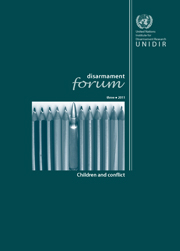The use of children in conflicts is abhorrent.
And although it is easy to demand that children have no place in the world's violent conflicts, the reality is very much different. The litany of tasks undertaken by children in conflict zones is well known—as are the physical, mental and sexual scars that result. While much children's participation in conflicts is forced at the barrel of a gun, others are forced by cruel circumstances and lack of alternatives. It is also difficult to extract children from these conditions. Disarmament and demobilization is made all the more difficult when the group feeds and clothes you, and when the commanders you fight under and the soldiers you support are the closest semblance of community that remains.
Under-Secretary-General Radhika Coomaraswamy, Special Representative of the Secretary-General for Children and Armed Conflict, introduces this issue of Disarmament Forum with a message from her office. The issue continues with an overview of the legal frameworks currently in place to protect children in conflict and how the many different international agencies working to protect children could be better coordinated. Authors examine ways in which the particular needs of girls and young mothers should be addressed and explain which programmes have succeeded and why. The issue concludes by challenging traditional concepts of childhood and warns of the danger of disarmament, demobilization and reintegration programmes which fail to take into account the circumstances which lead children to participate in armed groups and forces.
Citation: Kerstin Vignard (ed.) (2011). "Disarmament Forum: Children and Conflict", UNIDIR, Geneva.
Disponible aussi en français.
Content
- Editor’s note, Kerstin Vignard
- Special comment, Under-Secretary-General Radhika Coomaraswamy
- The international legal framework for the protection of children in armed conflict, Jaap Doek
- Disarming schools: strategies for ending the military use of schools during armed conflict, Bede Sheppard and Kyle Knight
- Gender-based insecurity and opportunities for peace: supporting the reintegration of young war-affected mothers, Miranda Worthen, Susan McKay, Angela Veale and Mike Wessells
- Universalism versus cultural relativism: improving DDR programming, Lysanne Rivard
- Selective outrage: the dangers of children’s DDR in eastern DRC, Claudia Seymour
- UNIDIR focus
